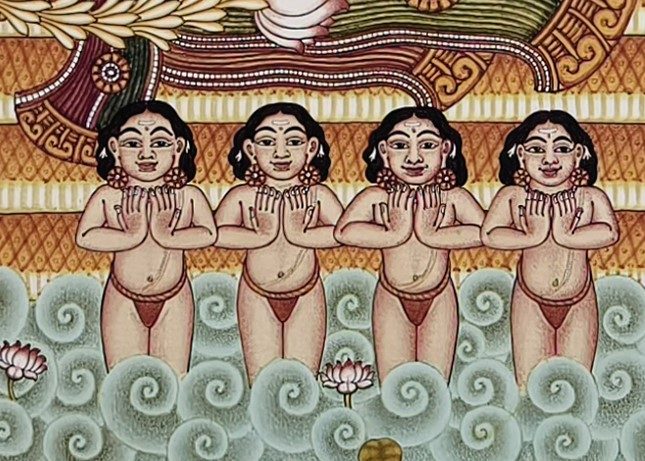SANAKADIKA (SANAKA etc.) SANAKA, SANANDANA, SANATANA and SANATKUMARA (Sanakadika pertains to all these four names) Sanaka and Sananda (Sanandana) could not know the limits of the Lord. (Asa Kabir, p. 478) Sanaka, Sanandana and Narada Muni serve Thee and always meditate on Thee, O Lord! (Gujri M. 4, p. 507) The sages of gods like Sanaka, Sananda, Shiva and Shesha Naga could not know Thy secret, O Lord! (Dhanasari Kabir, p. 691) Sanaka, Sanandana and many persons observing religious austerities ferried across the world-ocean by the grace of the Guru.
(Bhairo M. l, p. 1125) Sanakadika and Brahmadika (Brahma etc.) sing, also Suka and Prahlada sing the Praises of the Lord. (Sarag M. 5, p. 1224) Brahma etc., Sanaka etc., Sanaka, Sanandana, Sanatana and Sanatkumara, even for them, the Abode of the Lord is difficult to attain. (Asa M. 5, p. 401) In Bhagavata Purana, it is written that Brahma, while creating the world, after some initial failures, created four Munis (sages) viz., Sanaka, Sanandana, Sanatana and Sanatkumara.
But they did not like the work of creation and absorbed themselves in austerities and worship of the Lord-God. In this way, the very purpose of further creation by Brahma was defeated. This filled Brahma with great rage, from which sprang forth Rudra, who carried on the work of creation.
References :
1. Kohli,Surindar Singh ed,Dictionary of Mythological References in Guru Granth Sahib 1993
The Sanakadika Rishis, also known as the Four Kumaras, are revered sages in Hindu mythology. They are named Sanaka, Sanandana, Sanatana, and Sanatkumara, and are considered the mind-born sons of Lord Brahma, the creator god. These sages are significant figures in Hindu spiritual traditions, embodying purity, wisdom, and devotion.
Key Aspects of the Sanakadika Rishis:
Origins:
- The Kumaras were created by Brahma through his mental powers to assist in the process of creation. However, they refused to engage in worldly activities and instead chose a life of celibacy (brahmacharya) and devotion to God.
- They are described as eternally youthful and free from material desires, wandering the universe to spread spiritual knowledge.
Role in Hindu Philosophy:
- The Kumaras are considered Mahajanas (great devotees) in the Bhagavata Purana, and their teachings emphasize devotion (bhakti) and self-realization.
- They are associated with the path of inward contemplation (nivritti) and are revered for their profound spiritual wisdom.
Individual Significance:
- Sanaka: Represents ancient wisdom and timeless truths.
- Sanandana: Embodies eternal joy and contentment.
- Sanatana: Symbolizes the eternal nature of existence.
- Sanatkumara: Known as “eternal youth,” he is a teacher of spiritual sciences and is mentioned in the Chandogya Upanishad for his instructions on Bhuma Vidya (knowledge of the infinite).
Symbolism:
- The Kumaras represent purity, detachment, and the pursuit of spiritual enlightenment. Their refusal to procreate highlights their focus on higher truths rather than worldly attachments.
Legacy:
- The Kumaras play a significant role in various Hindu texts, including the Mahabharata and Puranas. They are often depicted as guides and teachers, imparting wisdom to gods, sages, and devotees.
The Sanakadika Rishis are celebrated for their unwavering devotion and their contributions to Hindu philosophy and spirituality.
Here are some quotes from the Guru Granth Sahib that align with the values upheld by the Sanakadika Rishis:
On Detachment:
- “The world is a drama, staged in a dream. Behold it with detachment.” (Guru Granth Sahib, Ang 1429)
- This reflects the Rishis’ choice to renounce worldly attachments and focus on spiritual enlightenment.
On Devotion:
- “Serve the True Guru fearlessly, and your doubt shall be dispelled.” (Guru Granth Sahib)
- The Rishis’ unwavering devotion to higher truths mirrors this teaching.
On Spiritual Wisdom:
- “When chanting, austere meditation, and self-discipline become your protectors, then the lotus blossoms forth, and the honey trickles out.” (Guru Granth Sahib)
- This aligns with the Rishis’ emphasis on meditation and self-realization.
On Equality and Unity:
- “There is one God; His name is Truth. He is the Creator, without fear, without hate, timeless and self-existent.” (Japji Sahib)
- The Rishis’ teachings on universal truth and unity resonate with this verse.
These quotes from the Guru Granth Sahib reflect timeless wisdom that transcends religious boundaries, offering guidance for spiritual seekers like the Sanakadika Rishis. Y



